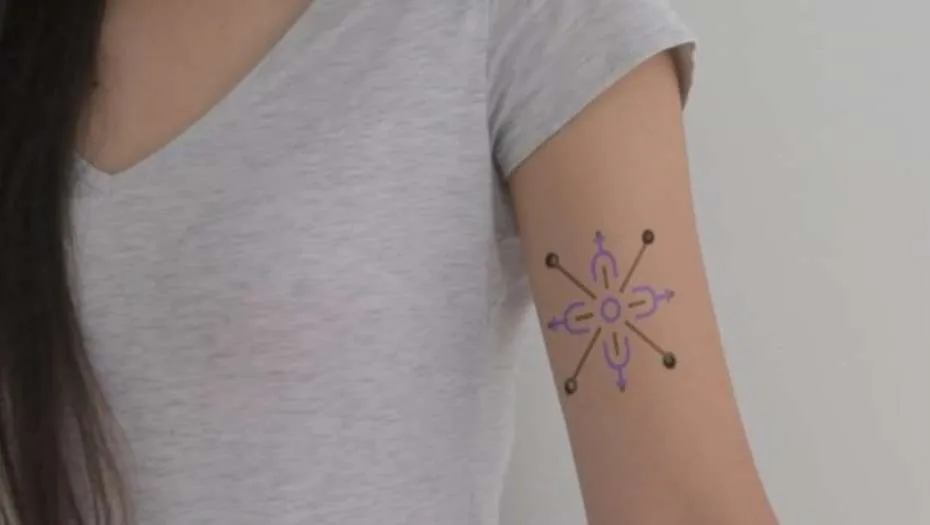fer
06/14/2017 10:05 a.m.
The body as an interactive screen.That is the concept behind the Dermalabysss project, which combines the advances of biotechnology with the traditional art of tattoo.
The project, which arises from the cooperation of researchers from the prestigious Technological Institute of Massachusetts (MIT) and the Harvard School of Medicine -Bas de Boston, United States-, is based on the replacement of inksTo make biosensors tattoos whose colors change according to variations in interstitial fluid (the liquid contained between the cells).
The researchers experienced with four biosensors that react to three biochemical data in body fluids.The increase in glucose levels translate into a change in the celestial to brown tattoo;Green is a sign of sodium increase;While the changes in the pH are evidenced with modifications that go from violet to pink (they also developed a second fluorescence sensor).
"It creates direct access and reflects the metabolic processes in the form of a tattoo," says the creators of Dermalabysss, who argue that it could be useful for diseases that require constant automonitors.People with diabetes whose treatment requires insulin application should be punctured to control their blood glucose values at different times, every day."We imagine a future in which the painful procedure is replaced by a tattoo that, through a color change shows the variations in glucose values," the researchers argue.
Diabetes: A tattoo changes color when glucose levels vary
Changes in body parameters translate into color variations.(Xin Liu, Katia Vega)
However, for the moment it is an experimental project that was tested in pork pieces and there are no plans to develop it shortly because current biosensors still have limitations that must be addressed before implantation.
Diabetes Tipo 1 desde 1.998 | FreeStyle Libre 3 | Ypsomed mylife YpsoPump + CamAPS FX | Sin complicaciones. Miembro del equipo de moderación del foro.
Autor de Vivir con Diabetes: El poder de la comunidad online, parte de los ingresos se destinan a financiar el foro de diabetes y mantener la comunidad online activa.
Sígueme en Instagram
LuVi
06/14/2017 12:52 p.m.
Today there is still inept in diabetes that the most curious thing is that they want to infect something new about it, this is the only thing they cause is to despair instead of encouraging patients.Do these alleged researchers, biomechanics, etc. of such prestigious universities, institutes and others do not know that the diabetic needs something non -invasive that measures it instantly and continuously, more exactly and reliable the level of glucose andYou alert it to a variable configured by each patient of that glucose ????And not that now we go back 50 years to the urine strips with strips of colors and a scale to see between glucose figures you were, but in a tattoo, it is sending flats.This type of news could be put in a section of absurd inventions to measure glucose.
DMT1 desde los 12 años (1991)
hbA1c= 6,2
Humalog y Toujeo (mayo 2017)
Humalog y Tresiba (mayo 2016 hasta mayo 2017)
humalog y NPH (desde inicio hasta mayo de 2016)
:)) :)) :)) :))
I understand you @luvi, for type 1 diabetics it makes no sense, but for types 2, that in many cases they are not facilitated to make control, and that all they have are results of HBA1C every 3 o6 months (at best), because he hears, I don't see it so bad, right?;)
Diabetes Tipo 1 desde 1.998 | FreeStyle Libre 3 | Ypsomed mylife YpsoPump + CamAPS FX | Sin complicaciones. Miembro del equipo de moderación del foro.
Autor de Vivir con Diabetes: El poder de la comunidad online, parte de los ingresos se destinan a financiar el foro de diabetes y mantener la comunidad online activa.
Sígueme en Instagram
Here I share a video about the tattoo ...
Diabetes Tipo 1 desde 1.998 | FreeStyle Libre 3 | Ypsomed mylife YpsoPump + CamAPS FX | Sin complicaciones. Miembro del equipo de moderación del foro.
Autor de Vivir con Diabetes: El poder de la comunidad online, parte de los ingresos se destinan a financiar el foro de diabetes y mantener la comunidad online activa.
Sígueme en Instagram


